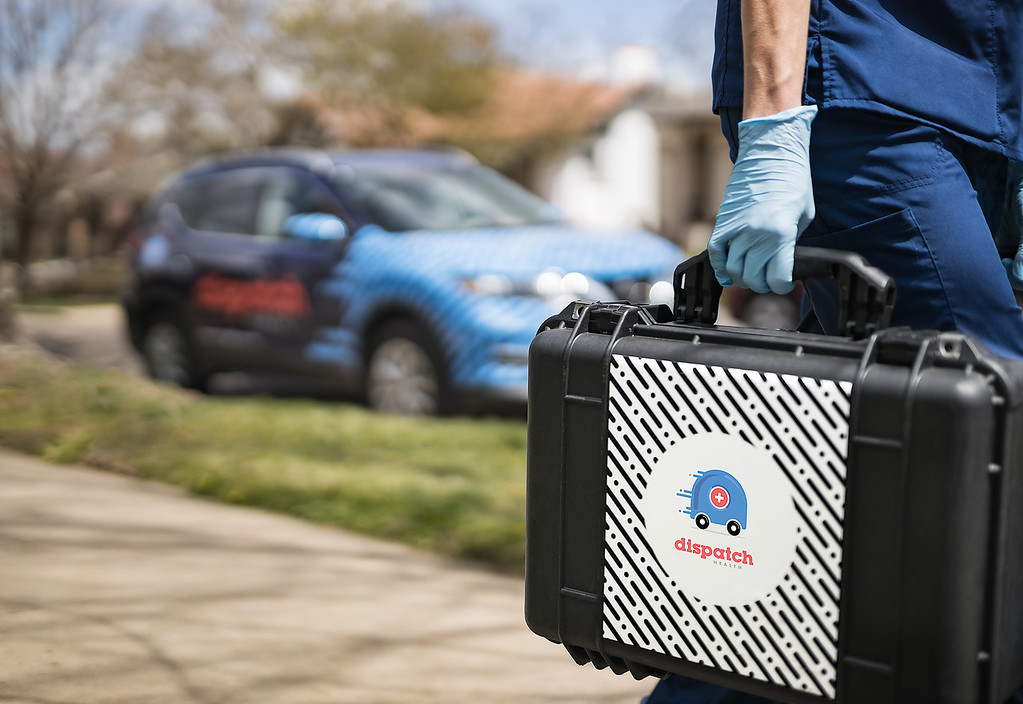
Dispatch health struck a partnership with Washington-based health system Multicare to offer a hospital-at-home program for its patients. Photo credit: DispatchHealth
As Covid-19 cases surge across the U.S., some hospitals are taking advantage of a new waiver from the Centers for Medicare and Medicaid Services that allows them to monitor patients at home. Multicare, a Washington-based health system, launched such a program in conjunction with Denver-based startup DispatchHealth.
“We’re all in the same position waiting for the post-Thanksgiving surge, and the surge on the surge that we think we will see for Christmas. We’re preparing for what we think may be some of our worst months in January to February,” said Christi McCarren, Multicare’s senior vice president of retail health and community-based care. “My role is to take some of the strain off of our hospitals and get something in place that will serve our community better.”

With the Rise of AI, What IP Disputes in Healthcare Are Likely to Emerge?
Munck Wilson Mandala Partner Greg Howison shared his perspective on some of the legal ramifications around AI, IP, connected devices and the data they generate, in response to emailed questions.
One of the many challenges that hospitals are facing right now is the difficulty discharging patients who are recovering from Covid-19. In addition to the concerning long-term symptoms that some patients face, nursing homes or assisted living facilities may be hesitant to bring in someone that has been diagnosed with Covid-19.
“It’s part of the reason we’re having capacity issues in our hospitals. Because you can’t discharge these people,” she said. “There’s a lot of fear right now. Nursing homes and senior living facilities are under fire. … This hospital at home model is one way we can care for people in more of an extended fashion that lets us free up capacity for people.”
Criteria for coverage
Multicare had worked with Dispatch Health for two years prior, offering a similar service for patients who were covered by private insurance. Now, with new CMS waivers, they can offer it to Medicare patients.
Patients receive daily rounding from DispatchHealth’s clinicians, with equipment to monitor their vitals at home and a button they can push if they need help. A registered nurse serves as a patient’s care coordinator. Medical equipment, physical therapists and meal services can be brought into the home during this time.
“Most of us understand that healthcare is eventually headed to the home. There was a movement there before Covid,” Dispatch Health CEO Dr. Mark Prather said. “Even after the pandemic, there will be interest in this model.”
In its recent guidance, CMS said more than 60 different conditions, such as asthma, pneumonia and congestive heart failure, can be treated at home with proper monitoring.
Good clinical judgment is certainly an important part of determining whether at-home care should be an option, but other factors come into the decision, such as whether a patient is frail and lives alone. Environmental factors are also taken into consideration, Prather said. For example: Does the patient’s home have working heat? Can they easily walk from their bedroom to the bathroom?
To be eligible for Medicare reimbursement, patients must be “admitted” from an emergency department or an inpatient hospital bed, after being evaluated in-person by a physician. A registered nurse must evaluate each patient daily, and they must have at least two in-person visits per day by either nurses or paramedics.
While the program does not have to be physically administered within a hospital to be eligible, it must be integrated enough that rapid escalation of care is seamless. Programs must also send weekly data to CMS, including whether patients’ care had to be escalated back to the hospital.
Multicare is launching the program in the Tacoma metro area to start, with plans to expand into Olympia and Seattle next year.
In addition to Multicare, several other hospitals have sought to participate in the waiver program. Some of them include Brigham and Women’s Hospital, Massachusetts General Hospital, Mount Sinai Health System and Huntsman Cancer Institute.














